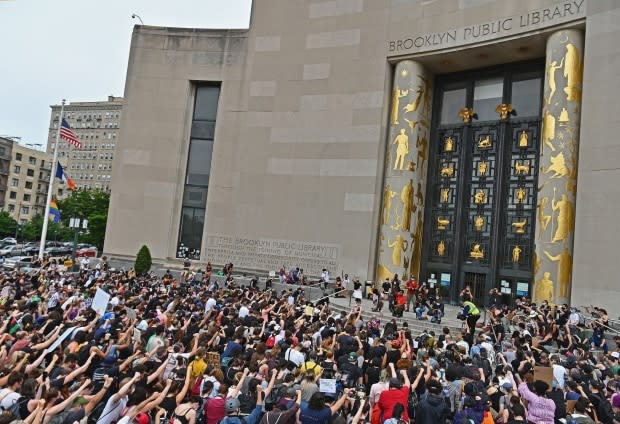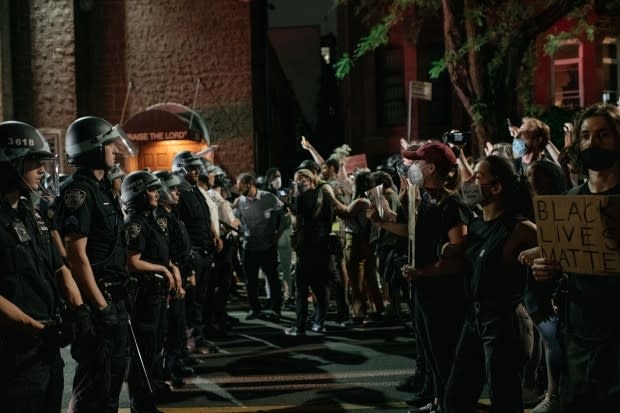Protesting amid a pandemic: New Yorkers vow to mask up and keep fighting
Thousands of people, standing shoulder to shoulder, screaming as loud as they can, is a scene that would have been unimaginable a few weeks ago during the height of the coronavirus outbreak in New York City. But now it's a reality, and there's nowhere Cordell Watts would rather be.
Watts was among a group of a few hundred that gathered in Washington Square Park earlier this week, a group that swelled as protesters marched through New York voicing their anger over the death of George Floyd under the knee of a police officer in Minneapolis. The protest was one of many in the city, and dozens going on across the U.S. and Canada this week.
"I feel like if I'm not here doing my part, I can't talk about liberation. I can't talk about Black Lives Matter if I'm not out here," Watts, an aspiring hip hop artist, said through a mask.
The majority of the crowd at the protest wore masks. They're still mandatory in New York state. New York City alone has had more than 202,000 coronavirus cases, almost 53,000 people were sent to the hospital and close to 22,000 people are confirmed or believed to have died because of the virus.
But the fact the city has yet to fully emerge from the pandemic's grip is secondary to the pursuit of justice for those in the streets.
"I feel like it is very telling that we're out here during a pandemic to fight for a change," Watts said.
Armed with masks
Eleana Sonera, who stood nearby, came to the march armed with a mask, hand sanitizer and gloves. The decision to potentially put herself in harm's way wasn't easy.
"For me personally, it's scary. I live with my grandmother and I'm sanitizing up to my elbows because I don't want her to be exposed to something that I might bring home," she said.

Sonera said the willingness of people to come out given the stark reality they've just lived through shows the protesters' determination to fight for police reform.
"I do think it's showing just how fed up people are," she said. "People are willing to come out in the middle of a pandemic and risk their own life for the lives of the people around them."
Racism as a public health crisis
Public health officials fear the close proximity of protesters will lead to new clusters of cases across the country. The U.S. Surgeon General issued a warning about a potential spike in cases, while Theresa Tam, Canada's chief public health officer, suggested virtual protest is safest.
New York Gov. Andrew Cuomo is among the public officials encouraging protesters to get tested for COVID-19. A number of jurisdictions from Seattle to Illinois are offering protesters free tests.
New York City has recommendations for protesting safely, such as wearing a face covering, sticking to small groups and making sure to physically distance from others.
The city's Health Department also suggests using signs and noisemakers instead of yelling, though that hasn't seemed to have had much uptake on the streets. Raucous chants of "I can't breathe" and "Black Lives Matter" echo through the city night after night.
But many health experts say many protesters shouldn't have to make a choice between voicing their concerns about policing and worrying about the coronavirus, when racial inequality in healthcare can be just as deadly.
"A person of African American descent in the U.S is more likely to die from the effects of structural racism than they are to die from the effects of the COVID-19 pandemic," said Mark Shrime, Director of the Center for Global Surgery Evaluations at Harvard Medical School.

Shrime said racism is itself a significant public health issue, a point echoed in statements supporting the protests from the American Medical Association and the American Academy of Pediatrics
African Americans have a shorter life expectancy than others, and are also subject to gaps in health insurance coverage and uneven access to services.
"Both of these pandemics: the pandemic of coronavirus and the epidemic of structural racism in the U.S , both must be addressed and they both happen to be flaring up at the same time," Shrime said via video conference.
The pandemic's uneven impact
Those inequalities were exposed and deepened during the pandemic especially in New York City, where African Americans and Hispanics have accounted for a disproportionate number of cases and deaths from COVID-19.
Anger that poorer, minority communities — home to more low-wage essential workers who were unable to quarantine — were affected by the virus more than white, affluent neighbourhoods by the virus, added to the fuel to the fire of protests in New York City.

"I think the wrong response is to ignore one or the other," Shrime said. "The right response is to make sure both are paid attention to and to make sure both are paid attention to as safely as possible."
He hopes that he's wrong but he says it's almost inevitable that there will be a spike in cases in a few weeks, once symptoms start to show.
Some experts have also expressed concern that police officers aren't always wearing masks, often hold large numbers of arrested protesters in close proximity, and use tear gas as a deterrent — a bad questionable tactic in light of the fact COVID-19 is a respiratory illness.
An acceptable risk
For protesters on the streets, it's a risk they're willing to take. In some places, protest caravans of people protesting from their cars are being used to demonstrate and isolate at the same time.
But those types of protests though aren't practical in a city the size of New York, so Edith Chase, who had stayed inside because of the pandemic, eventually decided to take to the streets.
"You know what, if I wear my mask and I follow the rules, that's all I can do," she said.
While Chase is trying to maintain physical distancing as much as possible, she feels protesters understand that they're all in it together, fighting both the pandemic and the epidemic of inequality in policing.
"The goal is change, and I think you have to make a decision that you're not going to stop marching until you see change."
Eleana Sonera says she's seen the pandemic bring out the best in people.
"I do notice it's bringing people together a little more," she said. "You know how many times I've been offered hand sanitizer, extra masks, water, wipes for our hands? I think it's showing the determination that some of us have."

